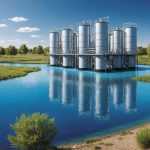Overview of Sustainable Water Management in UK Agriculture
Sustainable water management is crucial in UK agriculture, as it directly affects both crop production and environmental health. Water is a finite resource, and its management in agriculture is vital for ensuring food security and maintaining ecological balance.
The impact of agriculture on water resources in the UK is significant due to intensive farming practices and variable climate conditions. Excessive water extraction from rivers and aquifers, alongside pollution from fertilisers and pesticides, strains the country’s water reserves and damages aquatic ecosystems.
Also read : Unlocking the Power of AI: Enhancing Personalized Learning Experiences in UK Schools
To address these challenges, adopting eco-friendly practices is essential. Techniques such as rainwater harvesting, constructing efficient irrigation systems, and employing crop rotation are being implemented to enhance water conservation. These practices mitigate water waste, reduce pollution, and improve drought resilience in agriculture. Using technologies like soil moisture sensors aids in efficient water use.
Sustainable practices not only preserve water but also protect biodiversity and soil quality. By reducing reliance on chemical inputs and conserving resources, sustainable water management supports a more resilient agricultural system.
Additional reading : Unlocking Success: A Step-by-Step Guide to Digital Transformation for UK Enterprises
Focusing on eco-friendly practices in UK agriculture carries the dual benefit of securing crop yields and minimising environmental impact, fostering a sustainable future for the agricultural industry.
Best Practices for Eco-Friendly Water Usage
Exploring eco-friendly water usage involves adopting various water conservation techniques and leveraging advanced irrigation technologies to ensure sustainable agricultural practices.
Efficient Irrigation Methods
Efficient irrigation best practices are crucial in conserving water. Techniques such as drip irrigation, which delivers water directly to plant roots, significantly minimize waste. Unlike traditional systems that often lead to excess runoff and evaporation, drip irrigation ensures effective water application, thereby enhancing crop yield and reducing water usage.
Rainwater Harvesting Systems
Rainwater harvesting systems offer a sustainable solution for water scarcity. By collecting and storing rainwater, this method not only supplements the water supply but also reduces the dependency on conventional water sources. This technique is particularly beneficial in agriculture, where it aids in maintaining consistent irrigation during dry spells, thus supporting eco-friendly water usage.
Drip Irrigation Techniques
Drip irrigation techniques are celebrated for their cost-efficiency and precise water delivery method. By conserving water and lowering utility costs, these systems play a vital role in effective resource management. Their ability to maintain optimum moisture levels in the soil further supports plant health and maximizes agricultural productivity, making them an integral part of sustainable water conservation techniques.
Compliance with UK Water Regulations
Discussion about UK water regulations is essential, especially regarding agriculture. These regulations play a critical role in ensuring sustainable water practices, a concern of growing significance as climate change affects water resources. Farmers and agricultural businesses must navigate agricultural legislation to align with both environmental standards and legal demands.
Key Regulations Affecting Agriculture
Several regulations impact water usage in agriculture, focusing on reducing water pollution and conserving water resources. Farmers must be familiar with laws such as the Water Resources Act, which manages water abstraction and protects ecosystems. Compliance with these laws ensures that agricultural practices do not compromise water quality.
Importance of Compliance
Aligning with UK water regulations is crucial for promoting long-term sustainability. Compliance not only benefits the environment by maintaining ecosystems but also protects farms from legal penalties. It reassures the community that agricultural activities are contributing to the health of local water systems.
Compliance Strategies
To achieve compliance, agricultural enterprises should adopt specific compliance strategies:
- Conduct regular audits of water usage and wastage.
- Implement technologies for efficient water management.
- Engage with local environmental agencies for guidance and support.
By prioritizing these steps, farms can ensure that their operations are both legally sound and ecologically responsible. Adhering to regulatory standards highlights a commitment to sustainability and regulatory consciousness.
Case Studies of Successful Sustainable Practices
Exploring real-world examples offers valuable insights into the successful implementation of sustainable practices. In the UK, several farms have embraced sustainable water management, leading to notable results and benefits.
One exemplary case study is a UK farm that shifted towards rainwater harvesting and efficient irrigation systems. This transition not only reduced water usage but also lowered operational costs. As a result, the farm observed a 30% increase in overall productivity.
Another success story involves a UK farm that applied precision agriculture techniques. By employing advanced sensors and data analysis, the farm optimised water distribution. This case demonstrated a 20% reduction in water waste, highlighting the importance of technology in sustainable practices.
These case studies illustrate crucial lessons. Firstly, understanding regional water resources is vital. Secondly, technology plays a significant role in enhancing sustainable efforts. Lastly, collecting and analysing data aids in refining practices over time.
Farms can benefit from sustainable practices financially and environmentally. Implementing these techniques can lead to more resilient agricultural operations. Ultimately, the analysis of these outcomes underscores the feasibility and necessity of integrating sustainable water practices in the UK farming landscape.
Benefits of Embracing Sustainable Water Practices
Engaging in sustainable water practices offers numerous advantages, merging economic benefits with environmental improvements to create a win-win situation for communities and ecosystems alike.
Economic Benefits for Farmers
Adopting sustainable practices in water use can lead to significant economic advantages for farmers. By utilising efficient water management systems, farmers can reduce costs associated with water procurement and irrigation. This includes the use of technologies such as drip irrigation and rainwater harvesting, which optimise water usage and decrease reliance on expensive water sources. Additionally, these practices often lead to better crop yields and quality, enhancing marketability and income.
Environmental Impact Reduction
Besides economic gains, the environmental impact of sustainable water practices is profoundly positive. By reducing water waste and controlling runoff, these practices safeguard local ecosystems from pollution and depletion. They help maintain biodiversity and preserve water bodies by ensuring balanced natural water cycles, which are crucial for sustaining habitats and wildlife.
Community Health Benefits
Sustainable water management plays a pivotal role in enhancing community health. By preserving and improving local water resources, communities can enjoy cleaner, safer water for household and recreational use. This helps to reduce health risks associated with contaminated water, supporting overall public health and wellbeing. Sustainable practices also contribute to long-term water resource resilience, ensuring availability for future generations.
Resources and Further Assistance
Navigating the modern agricultural landscape can be daunting, but there are abundant resources for farmers eager to embrace eco-friendly practices. Government and non-government bodies actively provide support, ensuring sustainable farming methods receive the backing they need.
Many governments around the globe are offering assistance through grants and subsidies to promote water conservation. These financial aids are crucial in helping farmers acquire useful tools and technology for efficient water management. Moreover, many organizations offer training and support programs. These programs are designed to educate farmers on the latest sustainable methods, focusing on reducing water use and maximizing crop yields.
Another key resource is the technology tailored for eco-friendly agriculture. Technologies such as soil moisture sensors, which provide real-time data, help farmers make informed decisions and optimize water usage. Additionally, agricultural apps allow tracking weather patterns and soil conditions, offering further assistance to enhance resource management.
While the challenges of transitioning to sustainable practices may seem overwhelming, farmers have access to numerous resources that can guide them on their journey. By leveraging these tools, they not only improve their practices but also contribute to a healthier environment for future generations.







